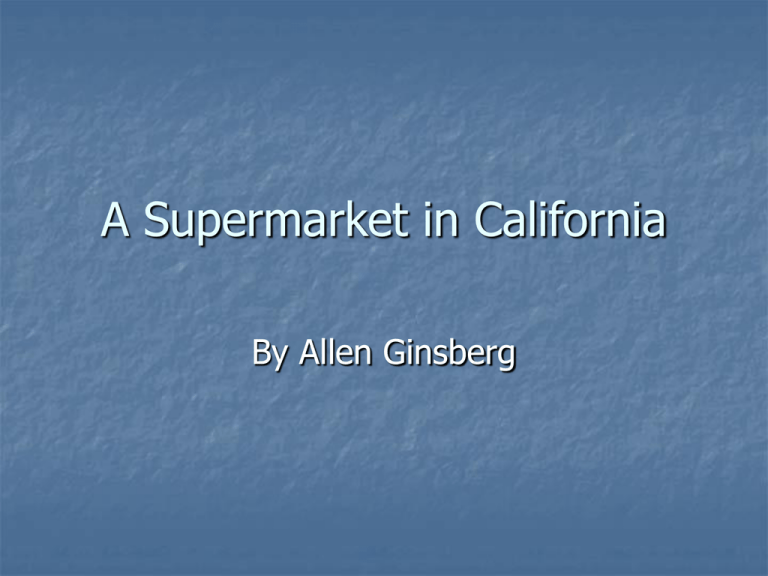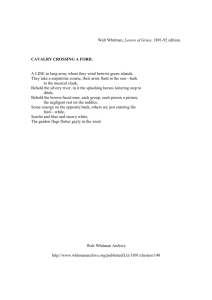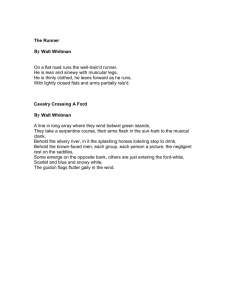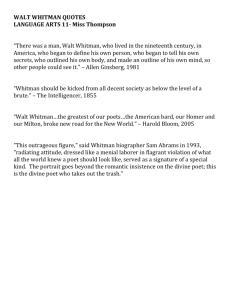A Supermarket in California
advertisement

A Supermarket in California By Allen Ginsberg Bio He was born in Newark in 1926 and died in 1997. His early life was troubled because of his mother’s battle with mental illness and this informed his poems. He traveled extensively throughout the world and was expelled from many communist countries (most notably Cuba) for being subversive, these travels influenced his work. He won the National Book award for The Fall of America, and was awarded the Order of Arts and Letters by the French Cultural ministry. His poem “Howl” was (and is) the source of much controversy over what some consider to be obscene themes and words. It and other poems like it was responsible for the repeal of many anti-obscenity laws. It remains his most famous work. He was also a musician and appears on The Clash’s album “Combat Rock.” He wrote “A Supermarket in California” in 1955 while living in Berkley. A Supermarket in California What thoughts I have of you tonight, Walt Whitman, for I walked down the sidestreets under the trees with a headache self-conscious looking at the full moon. In my hungry fatigue, and shopping for images, I went into the neon fruit supermarket, dreaming of your enumerations! What peaches and what penumbras! Whole families shopping at night! Aisles full of husbands! Wives in the avocados, babies in the tomatoes!--and you, Garcia Lorca, what were you doing down by the watermelons? I saw you, Walt Whitman, childless, lonely old grubber, poking among the meats in the refrigerator and eyeing the grocery boys. I heard you asking questions of each: Who killed the pork chops? What price bananas? Are you my Angel? I wandered in and out of the brilliant stacks of cans following you, and followed in my imagination by the store detective. We strode down the open corridors together in our solitary fancy tasting artichokes, possessing every frozen delicacy, and never passing the cashier. A Supermarket in California Where are we going, Walt Whitman? The doors close in an hour. Which way does your beard point tonight? (I touch your book and dream of our odyssey in the supermarket and feel absurd.) Will we walk all night through solitary streets? The trees add shade to shade, lights out in the houses, we'll both be lonely. Will we stroll dreaming of the lost America of love past blue automobiles in driveways, home to our silent cottage? Ah, dear father, graybeard, lonely old courage-teacher, what America did you have when Charon quit poling his ferry and you got out on a smoking bank and stood watching the boat disappear on the black waters of Lethe? Allen Ginsberg Reads “A Supermarket in California” YouTube - Allen Ginsberg- A Supermarket In California The Speaker The speaker is educated, but appears to be a lonely broken man. He is searching for meaning and something beautiful, something natural in modern America. The Subject The poem deals with the loss of the old America, the America that could have inspired Whitman. We see through the speaker the alienation and homogenization of modern America, and the speaker’s sadness about what he can never experience due to the unfortunate timing of his birth. Images The first images we see are inside the supermarket, where the speaker remarks on the produce and the “Aisles full of husbands! Wives in the avocados, babies in the tomatoes!” He compares the shopping families to the produce, because to him they are no different— no important story, no distinction deeper than age or sex. Images cont. Garcia Lorca is inserted as a contrast to the shoppers. He was a Spanish poet in the thirties whose works were censored by the fascist government of Franco after his death. He is a symbol of repressed art in America, and the speaker expresses surprise to see him out in the open and in a soulless supermarket. Images cont. Walt Whitman is a symbol of the old America, the America that the speaker wants to live in. He is described as an old fool who demands things no one asks or cares about anymore “Who killed the pork chops?” trying to find the story behind what he is buying although there no longer is any story behind anything in the supermarket. He is portrayed this way because according to the speaker a man like Whitman would not be able to remain sane in modern society, he would be reduced to a doddering old fool who wanders the supermarket at night. Images cont. The blue automobiles further the sense of conformity in America, the way it is stated implies that all of the cars are blue and the same. The entire last stanza uses mythological characters and settings to add a sense of grandeur to the death of Whitman. Organization Five stanzas Free verse Mostly long sentences broken up by commas with a few breaks of short exclamations, or questions. Organization I divided it into four sections: First stanza (lines 1-9), the speaker describes the supermarket and its patrons. Second stanza (lines 10-20) The speaker “meets” Walt Whitman and follows him through his dazed supermarket journey. Questioning (lines 21-29) The speaker questions “Whitman” about the literal plan for their night, and indirectly the reader “Where are we going, Walt Whitman?” This section is meant to question the course of modern America . The Death of Walt Whitman (lines 30-34) this brings the central question of the poem out “What America did you have,” it questions both the existence of the America both the speaker and Whitman yearn for, and our own modern America; the speaker is asking the reader directly about what America they have. Diction and Syntax The use of long sentences gives the poem the feel of an older work, possibly from the time of Walt Whitman. This impression is reinforced by the elevated language used (enumerations, penumbras, etc.) The poem is told in the past tense because the speaker is reflecting upon his experience, which he realizes is absurd when he finds the real Whitman represented by the book. This is done to highlight the questions which are in the present “Where are we going,” “Will we stroll.” The questions are in the present because the speaker means for them to transcend the specific circumstances of the poem and become questions the reader is supposed to ask himself. The other instance that the present is used is in the description of the supermarket. It is used there because those shoppers and their actions are interchangeable with all other shoppers at all times. The observations at the supermarket are also given exclamation points to convey the feeling that everything in modern America is loud, full of false excitment, and right NOW! Conclusion “A Supermarket in California” is a poem that is meant to question the notions that modernization is better and that all progress is good progress. It bemoans the prevailing ideas of fast, cheap, mass produced. It yearns for a simpler time, a time that could produce men like Walt Whitman the “old courage-teacher” who not only was a symbol of old America, but also is a symbol of non-conformism and protest. The America seen by the poem is one devoid of art and of true human expression. It encourages us to question, to work for change, and to appreciate the few remaining vestiges of the “lost America of love” A Supermarket in California What thoughts I have of you tonight, Walt Whitman, for I walked down the sidestreets under the trees with a headache self-conscious looking at the full moon. In my hungry fatigue, and shopping for images, I went into the neon fruit supermarket, dreaming of your enumerations! What peaches and what penumbras! Whole families shopping at night! Aisles full of husbands! Wives in the avocados, babies in the tomatoes!--and you, Garcia Lorca, what were you doing down by the watermelons? I saw you, Walt Whitman, childless, lonely old grubber, poking among the meats in the refrigerator and eyeing the grocery boys. I heard you asking questions of each: Who killed the pork chops? What price bananas? Are you my Angel? I wandered in and out of the brilliant stacks of cans following you, and followed in my imagination by the store detective. We strode down the open corridors together in our solitary fancy tasting artichokes, possessing every frozen delicacy, and never passing the cashier. A Supermarket in California Where are we going, Walt Whitman? The doors close in an hour. Which way does your beard point tonight? (I touch your book and dream of our odyssey in the supermarket and feel absurd.) Will we walk all night through solitary streets? The trees add shade to shade, lights out in the houses, we'll both be lonely. Will we stroll dreaming of the lost America of love past blue automobiles in driveways, home to our silent cottage? Ah, dear father, graybeard, lonely old courage-teacher, what America did you have when Charon quit poling his ferry and you got out on a smoking bank and stood watching the boat disappear on the black waters of Lethe?


